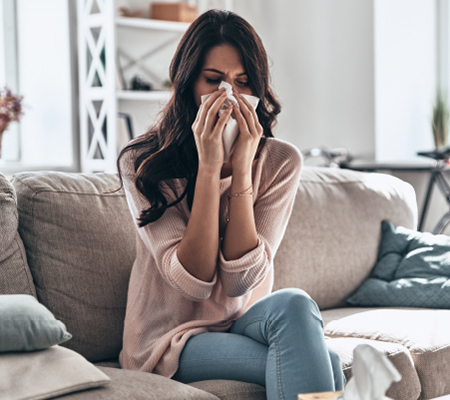An allergy is the immune system’s overreaction to foreign substances that are usually harmless in most people. There is a spectrum of symptoms that range from mild to life-threatening. But even if yours are minor, these are signs you should see an allergist.

Symptoms to watch for
As with many health conditions, symptoms vary. Your experience can differ if you suffer from seasonal allergies versus a food allergy, for example. But the most common reactions include:
- Runny nose, coughing and sneezing
- Breathing issues
- Watery eyes
- Itching
- Skin reactions like a rash or hives
- Stomach or bowel problems
Things an allergist can help with
“The most common thing we see patients for is seasonal allergies,” said Dr. Priyanka Timothy, allergist & immunologist with Marshfield Clinic Health System. “Kids and adults alike experience the nasal congestion and red, watery, itchy eyes that often accompany these types of allergies.”
Allergists also help with asthma. Asthma is an inflammation of the lungs which can be triggered by allergies. Medications can be given to decrease the inflammation in general or “rescue” the lungs if someone is having a more serious reaction.
You should also see an allergist for skin conditions. These may be in the form of rashes or hives, but also eczema.
“Fundamentally, eczema is a decreased efficiency of your skin to retain moisture,” said Dr. Timothy. “People who have eczema experience itching, dryness, or irritation of the skin. Their allergic cells try to help the situation. They’re well-meaning but aren’t really helping. They create more inflammation and itching and actually make things worse.”
You’ll want to see an allergist regarding reactions to food, insect venom and medications, as well. These can cause an anaphylactic reaction, which is a life-threatening emergency because other body systems, including the airways and cardiovascular system can be affected.
What to expect at the office
When you see an allergist, you’ll be asked about your symptoms, lifestyle and medical history. Most people will also receive a skin prick test. It is used to place small drops of various allergens on the skin to see if they lead to an immediate reaction.
“It feels similar to a toothpick poking your skin,” said Dr. Timothy. “The test is relatively well-tolerated.”
It takes only 15-20 minutes to receive results.
How do you know when it’s time?
After you have severe reactions, especially anaphylaxis, you should see an allergist. Staff will not only be able to diagnose your allergy, but they will also teach you how to properly use epinephrine injectors if those are recommended for the future.
Dr. Timothy also recommends checking in to see if small improvements can be made to your quality of life.
“I believe even if you have just a little bit of ongoing nasal congestion or runny nose, it’s beneficial to know what you’re allergic to because then you can go home and mitigate those exposures,” she said. “Some people who don’t have allergies spend a lot of money on things that aren’t going to change their symptoms.”
It can be difficult to tell if you have allergies or a viral illness, especially during the colder months. They share many common symptoms. Check out our blog on the difference between colds and allergies to learn more.
For allergy concerns, talk to a Marshfield Clinic Health System provider.
Schedule appointment Message your provider
Related Shine365 articles
Tonsillitis and treatment: When to have tonsillectomy
Manage asthma in cold weather this winter
Ear infections: Ways to recognize and treat

